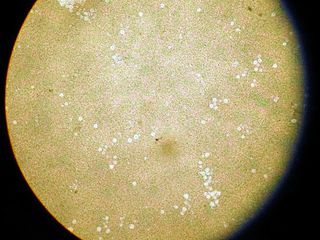An anaerobic organism or anaerobe is any organism that does not require molecular oxygen for growth. It may react negatively or even die if free oxygen is present. In contrast, an aerobic organism (aerobe) is an organism that requires an oxygenated environment. Anaerobes may be unicellular or multicellular. Most fungi are obligate aerobes, requiring oxygen to survive. However, some species, such as the Chytridiomycota that reside in the rumen of cattle, are obligate anaerobes; for these species, anaerobic respiration is used because oxygen will disrupt their metabolism or kill them. The sea floor is possibly one of the largest accumulation of anaerobic organisms on our planet, where microbes are primarily concentrated around hydrothermal vents. These microbes produce energy in absence of sunlight or oxygen through a process called chemosynthesis, whereby inorganic compounds such as hydrogen gas, hydrogen sulfide or ferrous ions are converted into organic matter.
Diazotrophs are bacteria and archaea that fix atmospheric nitrogen (N2) in the atmosphere into bioavailable forms such as ammonia.

The Rhizobiaceae is a family of Pseudomonadota comprising multiple subgroups that enhance and hinder plant development. Some bacteria found in the family are used for plant nutrition and collectively make up the rhizobia. Other bacteria such as Agrobacterium tumefaciens and Rhizobium rhizogenes severely alter the development of plants in their ability to induce crown galls or hairy roots, respectively. The family has been of an interest to scientists for centuries in their ability to associate with plants and modify plant development. The Rhizobiaceae are, like all Pseudomonadota, Gram-negative. They are aerobic, and the cells are usually rod-shaped. Many species of the Rhizobiaceae are diazotrophs which are able to fix nitrogen and are symbiotic with plant roots.
The Beijerinckiaceae are a family of Hyphomicrobiales named after the Dutch microbiologist Martinus Willem Beijerinck. Beijerinckia is a genus of free-living aerobic nitrogen-fixing bacteria. Acidotolerant Beijerinckiaceae has been shown to be the main bacterial methanol sink in a deciduous forest soil and highlights their importance for the conversion of methanol in forest soils.

Azomonas species are typically motile, oval to spherical, and secrete large quantities of capsular slime. They are distinguished from Azotobacter by their inability to form cysts, but like Azotobacter, they can biologically fix nitrogen under aerobic conditions (diazotrophs).

Soil biology is the study of microbial and faunal activity and ecology in soil. Soil life, soil biota, soil fauna, or edaphon is a collective term that encompasses all organisms that spend a significant portion of their life cycle within a soil profile, or at the soil-litter interface. These organisms include earthworms, nematodes, protozoa, fungi, bacteria, different arthropods, as well as some reptiles, and species of burrowing mammals like gophers, moles and prairie dogs. Soil biology plays a vital role in determining many soil characteristics. The decomposition of organic matter by soil organisms has an immense influence on soil fertility, plant growth, soil structure, and carbon storage. As a relatively new science, much remains unknown about soil biology and its effect on soil ecosystems.

Bradyrhizobium is a genus of Gram-negative soil bacteria, many of which fix nitrogen. Nitrogen fixation is an important part of the nitrogen cycle. Plants cannot use atmospheric nitrogen (N2); they must use nitrogen compounds such as nitrates.
The Nitrobacteraceae are a family of gram-negative, aerobic bacteria. They include plant-associated bacteria such as Bradyrhizobium, a genus of rhizobia associated with some legumes. It also contains animal-associated bacteria such as Afipia felis, formerly thought to cause cat-scratch disease. Others are free-living, such as Rhodopseudomonas, a purple bacterium found in marine water and soils. The strain Rhodopseudomonas palustris DX-1 can generate an electric current with no hydrogen production, a trait being explored in the development of the microbial fuel cell. The genus Afipia has also been found in the atmosphere, where it uses methylsulfonylmethane as a carbon source.
Azorhizobium is a genus of Gram-negative soil bacteria. They fix nitrogen in symbiosis with plants in the genus Sesbania. Strain ORS571 of A. caulinodans has been fully sequenced.
Methylobacterium nodulans is an aerobic, facultatively methylotrophic, legume root nodule-forming and nitrogen-fixing bacteria.
Devosia neptuniae is a nitrogen-fixing bacteria that nodulates Neptunia natans. It is Gram-negative, strictly aerobic short rod-shaped and motile by a subpolar flagellum. The type strain of D. neptuniae is LMG 21357T.
Microvirgula aerodenitrificans is a species of bacteria, the only species in its genus. It is a Gram-negative, catalase-and oxidase-positive, curved rod-shaped and motile denitrifier. It is aerobic as well as an anoxic heterotroph, having an atypical respiratory type of metabolism in which oxygen and nitrogen oxides are used simultaneously as terminal electron acceptors. SGLY2T is its type strain.
Beijerinckia derxii is a nitrogen fixing strain of bacteria from the genus of Beijerinckia.
Beijerinckia indica is a nitrogen fixing, aerobic acidophilic bacteria from the genus of Beijerinckia.
Beijerinckia mobilis is a nitrogen fixing bacteria from the genus of Beijerinckia.

Azotobacter chroococcum is a bacterium that has the ability to fix atmospheric nitrogen. It was discovered by Martinus Beijerinck in 1901, and was the first aerobic, free-living nitrogen fixer discovered. A. chroococcum could be useful for nitrogen fixation in crops as a biofertilizer, fungicide, and nutrient indicator, and in bioremediation.
Microvirga lupini is a nitrogen-fixing, Gram-negative, aerobic rod-shaped and non-spore-forming bacteria from the genus of Microvirga.
Azospirillum is a Gram-negative, microaerophilic, non-fermentative and nitrogen-fixing bacterial genus from the family of Rhodospirillaceae. Azospirillum bacteria can promote plant growth.
Cellvibrio diazotrophicus is a Gram-negative, rod-shaped, aerobic and nitrogen-fixing bacterium from the genus of Cellvibrio which has been isolated from the rhizosphere of the plants Plantago winteri and Hordeum secalinum near Münzenberg in Germany.
Hartmannibacter is a Gram-negative, nitrogen-fixing, strictly aerobic and motile genus of bacteria. Hartmannibacter is named after the German microbiologist Anton Hartmann. Hartmannibacter diazotrophicus has been isolated from rhizospheric soil of the plant Plantago winteri.




